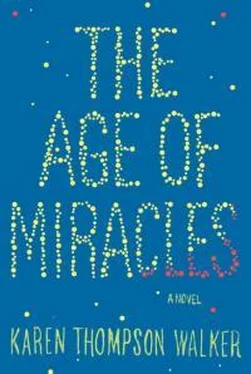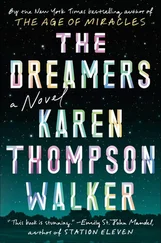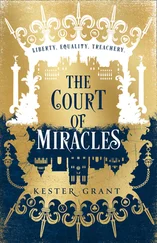She kept walking.
“Not the friendliest bunch,” said my mother.
We passed a series of greenhouses. Everywhere we looked, sheets dangled from clotheslines.
At the end of one cul-de-sac, we arrived at what was obviously meant to be the community swimming pool, no doubt touted in the original brochures for the project. But it was only a dry hole in the ground, deep at one end, shallow at the other, and not yet lined with cement.
Beside the pool was a small playground where a girl in a green sundress was sitting on one of the swings, her brown hair flying around in the wind. I recognized her from soccer: Molly Kopachek.
“Stop here,” I said. I rolled down my window. “Molly?”
She looked up, pulled her hair from her face, and twisted a makeshift bun. We’d been fullbacks together one year, but she was not the competitive kind. She used to pick dandelions in the penalty box during games.
Now she hopped from the swing and walked to my window, her sandals grinding the dirt.
“Are you moving here, too?” she said.
Behind her stood a skeletal structure, a wooden frame, suggestive of a house.
“We’re just looking for my grandpa,” I said.
She hadn’t seen him, but when I said Chip’s name, she pointed across the street.
“I think there might be a guy named Chip staying at that house over there,” she said.
My father pulled the parking brake.
The exterior of the house was coated in unfinished gray stucco. Paint cans lay scattered nearby.
A wisp of a girl in a white tank top stood smoking a cigarette out front. She was lanky and pale, her head was shaved, and she stared at us through a pair of oversize sunglasses as we approached the house. I could see the sky in her lenses. It was everywhere, that sky, somehow wider in the desert, more visible, than anywhere else on earth.
“Are you his parents?” she said when my father asked about Chip. From inside the house, guitar chords floated out to us in waves. Someone was singing. It was so hot I could barely breathe.
“We just want to talk to him,” said my mother.
The girl took a long slow breath and exhaled. She held her cigarette with two fingers near her hip. The smoke smelled different from other smoke: cloves.
“I think he’s out back,” she said. She nodded toward the front door but didn’t move. “It’s unlocked.”
Inside, we found a living room empty of furniture but lined with sleeping bags, at least one of which was occupied. A ceiling fan spun insufficiently, circulating hot air.
“Hello?” said my father. He looked around. He didn’t seem to know where to stand. A recycling bin had overflowed in the hall. Empty wine bottles lay like bowling pins on the hardwood floor.
The music was coming from the kitchen, where two girls—each one as willowy as the one out front—sat in mismatched chairs while a boy without a shirt played guitar.
The boy was the first to see us. The music stopped.
“Yes?” he said.
The girls turned sluggishly toward us. Their eyes were watery and red. They laughed as soon as they saw us. My small family was in the kitchen of strangers.
“We’re looking for Chip,” said my father. His words, crisp and quick, sliced embarrassingly through the air. I thought I could feel it then, the slowness of the house around us, the sluggish pace at which time unfolded in this place.
The girls glanced outside to the back of the house.
“Hey, Chip,” called the boy. “Your dad’s here.”
The girls laughed, and the boy began to play again.
They were college kids, or formerly so—I’d heard they were dropping out by the thousands, stealing clocks from classrooms and smashing them in the streets.
Outside, Chip looked the same as ever: black T-shirt and cutoff black shorts, black tennis shoes, dyed black hair. Under the shade of a frayed umbrella, he was reading a book in a faded beach chair.
He was startled to see us.
“What are you doing here?” he said.
“Did my father come here with you?” said my father.
By now the question sounded ridiculous. My grandfather was not in this house.
“No,” Chip said. He set the book flat on his lap. “Why?”
A few feet away, a young couple lay intertwined on a lawn chair. They didn’t notice us, or they didn’t care. They kissed for a long time, and my mother made a show of holding her hand up to the side of her face to block the view.
My father showed Chip one of the flyers we’d found at my grandfather’s house.
“I know he agrees that clock time is total bullshit,” said Chip. “But if he’s not at home, I don’t know where he is.”
The back patio was fenceless. There was no yard. It opened out to the desert, where a vast field of solar panels sparkled in the sun.
“That’s where we get our power,” said Chip when he saw me staring.
The electrical grid did not extend this far into the desert. Water had to be trucked in as well.
“You should think about joining us out here,” said Chip. “You know, tune out, drop in.”
“It’s tune in , drop out ,” said my mother. She was fanning herself theatrically with a magazine she’d pulled from her purse. “Let’s go.”
My father wrote his cell phone number on a scrap of paper and handed it to Chip.
“If you see him or hear from him,” he said, “please call.”
Chip walked us back through the house and outside. The girls were still laughing as we passed. They couldn’t seem to stop.
“You probably think we’re a bunch of pipe dreamers out here,” said Chip. The girl beside him lit another cigarette. “But it’s just the opposite. We’re not the ones in denial.”
The wind was picking up, blowing bits of dust and trash around in little circles in the street. Soon we would leave this place, and I would listen to my heartbeat for a while, trying to catch it speeding up as we drove.
“We’re the realists,” Chip added. “You’re the dreamers.”
My grandfather once had an uncle who disappeared in Alaska. It was 1970, early summer near the Arctic Circle, twenty-two hours of daylight per day. This uncle was a fisherman who had come to Alaska from Norway three decades earlier and had become a legend along a certain stretch of coastline, renowned for his ability to predict where the salmon ran thickest as they spawned. He lived alone on a tiny island a few miles off the coast. He was frugal. He slept in a one-room cabin with no electricity or running water, and he buried the money he made in a secret location on the island. My grandfather spent two salmon seasons working for him, and for decades afterward, my grandfather kept a small photograph of him, dressed in waders and a black knit cap, a tangled net draped over thick knuckles.
One day this uncle set out alone on his fishing boat. It was a short trip from the port to the island. The sky was clear. The sea was calm. He was never seen again.
“It was June,” my grandfather used to say, as if he’d been there on that day. By 1970 my grandfather was living in California again, but whenever he told this story, he made a sweeping gesture with the palm of his hand to indicate the flatness of the ocean on the day his uncle vanished.
“The weather was perfect,” he’d say. “Not a shred of wind.”
His uncle was presumed lost at sea. But my grandfather never believed it. Several searches of his property failed to unearth his fortune.
“Rolf could handle anything on the water,” he would often say. “There’s no way that boat sank.”
Fifteen years passed. No one heard from the uncle.
And then my grandparents took a trip to Norway—this was years before I was born. They were riding a bus in the northern part of the country, where my grandfather’s relatives lived. When the bus stopped in a small fishing village, an old man boarded the bus.
Читать дальше












